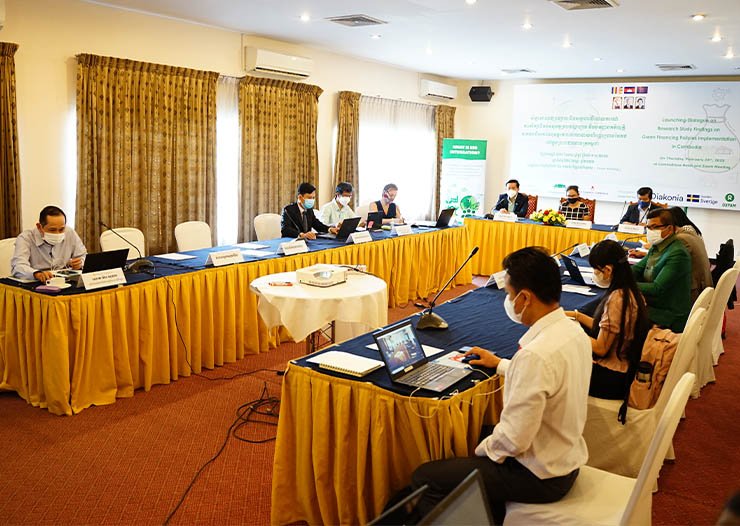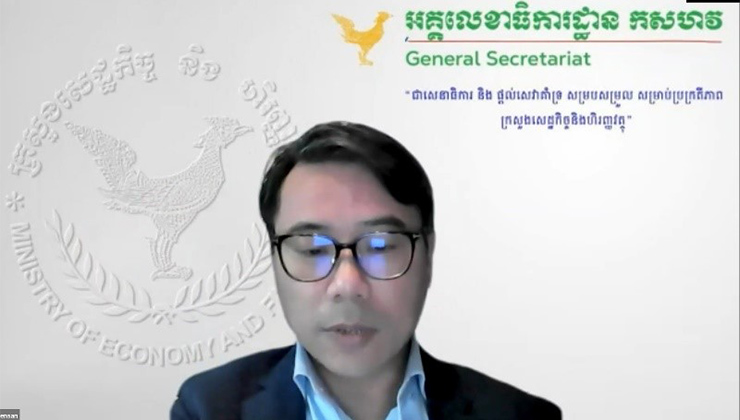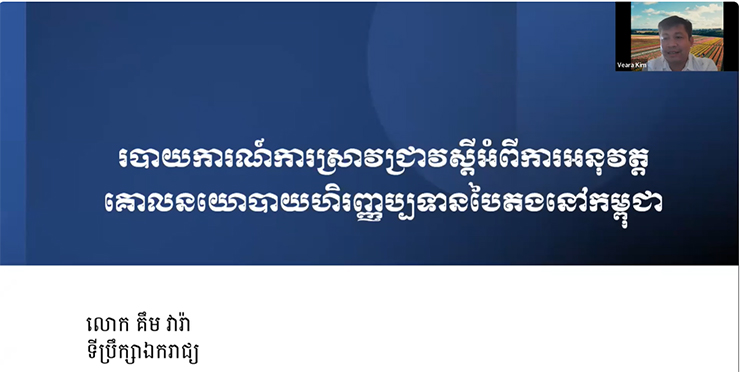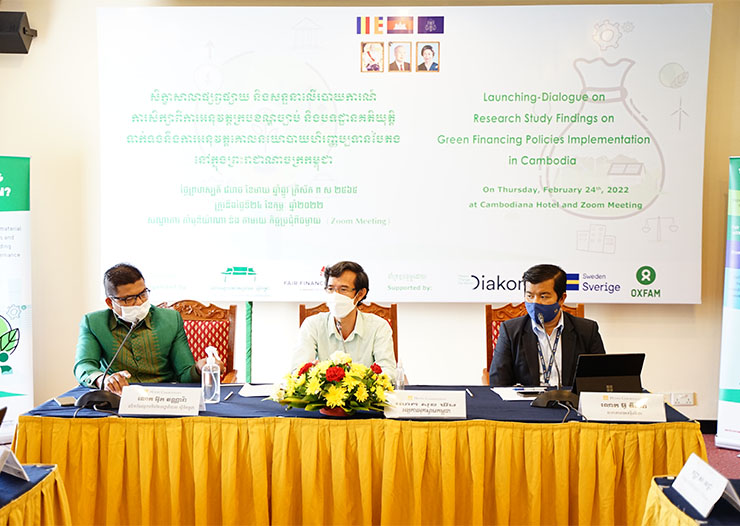
On 24 February 2022, The NGO Forum on Cambodia (NGOF) and Fair Finance Cambodia co-organized Launching and Dialogue on Research Findings on Green Financing Policies Implementation in Cambodia which supported by Diakonia and Oxfam.
Welcome Remark by Dr. Tek Vannara – Executive Director of The NGO Forum on Cambodia
Taking this opportunity, Dr. Vannara would like to inform you about the dissemination of this report is designed to provide opportunities for key stakeholders, in particular, the Ministry of Economy and Finance, the Ministry of Environment, the National Bank of Cambodia, the Association of Banks in Cambodia, and the Securities and Exchange Regulator of Cambodia, together with development partners and members of the Fair Finance Coalition Cambodia (FFC), discussed the report on the implementation of legal frameworks and regulations related to the implementation of green finance policies in Cambodia.

Remark by H.E. Meas Sok Sem San, Deputy Secretary-General of the General Secretariat of the Public Financial Management Reform Steering Committee
The Ministry of Economic and Finance (MEF) has an obligation to identify different policies to give direction to use economic and tax policies in order to affect and respond to social and human well-being as well as the effectiveness of the government’s financing. In the public framework, we keep working through our government’s agencies, which include ministries and institutions that implement activities related to the environment. We have many ministries and institutions working on environmental factors, and the government has related policy frameworks, for example, rectangular strategy, which values environmental protection in each government’s mandates. In particular, the last mandate of the Royal Government of Cambodia, we encourage all ministries and institutions to keep working and have important policies to respond to environmental issues. Let me add some points as well as draw your attention to the fact that we do many things in the public sector and we have engaged many stakeholders. Coordination with the private sector is also another job of MEF through our agents, including NBC and SERC, even though MEF is not a directed mandate for that. We must work together to make environmental protection happen. Cambodia considers what is important and emergent to respond to as well as what is in the best interests of the world. Let me also clarify that MEF has the responsibility of coordinating the green financing, and all implementation is dependent on the fund/budget and sources of funds to be used for the process of activity implementation. Eventually, since the past (1990s), we have depended on the sources of funding from overseas (ODA) for almost 80% of the total budget. Thus, some agendas were based on funding from overseas, which surely shows that Cambodia has been working to protect the environment since the 1990s. Now the funding from overseas has been reduced to about 20%, and Cambodians have their own ability to use their own budget to contribute to the policy implementation in the country. We have more than 80% of the national budget to manage at our national expenses for all ministries and institutions. The Royal Government of Cambodia also pays attention to the environment. The key agents of the government that are working to promote the environment are the MoE and other ministries in order to contribute to the main policy.
Remark by Mrs. Phean Sophoan, Director of Oxfam Cambodia
Oxfam Cambodia worked together with partners to establish Fair Finance Cambodia (FFC) in 2019, and until now, FFC has had five members, including (1) the NGO Forum on Cambodia, (2) Cooperation Committee for Cambodia, (3) Transparency International Cambodia, (4) ActionAid Cambodia, and (5) Oxfam Cambodia. FFC is a member of Fair Finance Asia, which has membership from eight countries in Asia. The purpose of Fair Finance Asia is to contribute to the financial institutions’ making decisions on finance provisions in the region with social, environmental, and human well-being responsiveness. Oxfam Cambodia has had the privilege of working with a variety of partners over the years, including government institutions, NBC, SERC, ABC, and research institutions, as well as banks and NGOs. Our purpose is to promote the financial sector to ensure sustainability, and we are implementing one specific project named “Fair Finance Cambodia (FFC)”.

Presentation of Report on Green Financing Policy Implementation in Cambodia by Mr. Kim Veara, External Consultant
The financial and banking sectors have been considered to play an essential role in promoting sustainable economic growth. The proliferation of a large number of banking and financial institutions by 2019 in Cambodia is a clear testament to the growth of economic activity in the country, including a rise in investment or development projects, which matches the aims of the Development Policies of the RGC. The damage to the environment and resources caused by unsustainable development projects can often be indirectly and, in some cases, directly linked to financial institutions’ credit policies and lending practices. This issue becomes more acutely evident if these institutions do not require their clients to conduct environmental and social impact assessments as part of the loan usage policies for development projects. A recent study by Fair Finance Cambodia (FFC) on the Social and Ecological Impact Assessment (ESIA) compliance in the banking sector in Cambodia proposed clear policy options for both the banking sector and the MoE.
New non-banking sector actors that facilitate sustainable/responsible financial markets have emerged in many different forms in response to recent macroeconomic policies and socio-economic development and growth in Cambodia. Among them, the Securities and Exchange Regulator in Cambodia (SERC) has played a crucial role as a regulatory body on securities and exchange transactions in Cambodia, which is essential for promoting ESG frameworks and integrating the United Nations Guiding Principles on Business and Human Rights (UNGPs) criteria. To understand the implementation of ESG policies and regulations by SERC, FFC, through the NGO Forum on Cambodia, undertook a study to examine if SERC’s policies and regulations have incorporated ESG principles in regulation and enforcement, focusing primarily on green financing.

Closing Remark by Mr. Sok Khim, representative from Oxfam
This case makes them think about responsible and sustainable investment. To be sustained, they do not think only investing that is profitable in the short but affect the environment and society, and encourage them to think about social and environmental impact. Creating demand for the private sector to promote Green Financing related to taxonomy is a good thing. The government already has some policies, so we just build more, especially as we listened to our workshop this morning, we discussed the need for defining what Green Financing means for Cambodia context then we will be able to create more on Green Financing Policies. The legal framework related to Green Financing for our country is a step we can start. I recognize that the Green Financing concept is a new for Cambodia and this research is a starting point. I hope there will be further research on the recommendations given by our speakers this morning. It is hoped that our Fair Finance Cambodia Coalition with Oxfam and other partner organizations or other donors will continue to work with relevant ministries, particularly the MEF, NBC, ABC to continue to promote and implement our Green Financing. In addition, I would like to thank the representatives from the NBC, ABC and other stakeholders for input. Without the involvement of all institutions, this study would not have been possible. I would also like to thank the NGO Forum, a member of the Fair Finance Cambodia Coalition, for these efforts to make this study success even there are some challenges.